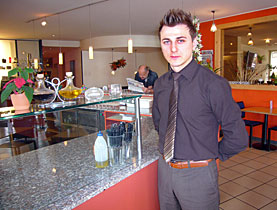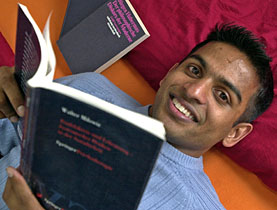“Our Switzerland is a multicultural country”

Tefit Maqkaj, who came to Switzerland from Kosovo in the 1990s, could have had a Swiss passport a long time ago but he just hasn't found the time to apply for one.
He left the country as a teenager and now runs a pizzeria in the Swiss capital, Bern.
Maqkaj moves around “his” restaurant discreetly, yet with self-confidence, sends a waiter to the counter where a pizza is ready and takes the menu himself to a table where four people are sitting.
The 30-year-old manager of the Strada has spent half his life in Switzerland.
“If you go to school here and are in continual contact with various cultures, you become integrated very quickly,” the Kosovo Albanian told swissinfo in perfect Swiss German with just a touch of a foreign accent.
“I mean not only the culture of German Switzerland but also the Italian and French regions. Our Switzerland is multicultural.”
He does not have to mention that he feels more Swiss than Kosovo Albanian, but he does so just the same.
Maqkaj comes from Prizren in the south of Kosovo. His father left the country more than 30 years ago and has long held a Swiss passport. His mother followed and then the children. Maqkaj did the last three years of basic education in Switzerland.
Love story
“At the beginning, my father went for a few months at a time to Switzerland, then for several years, and eventually he fell in love with the country,” Maqkaj said.
In the meantime the family have lived so long in Switzerland that they would probably have problems integrating back in Kosovo.
“I know no one down there any more apart from a few relatives,” said Maqkaj, who came to Switzerland when he was 15. When the family travels to Prizren for a week or two of holidays, they stick out immediately. “The people know that we do not belong.”
The young man’s career is that of a dishwasher made good – but in his case it started with espresso cups and glasses rather than dishes. He was just 17 when he started.
“Over time I began to climb the ladder, first as a waiter, then as a managerial assistant and later manager,” he explained, as though this was a matter of course.
Qualification
Parallel to his practical work, he studied for his restaurant manager’s qualification in Bern. When he heard that the Strada was to become available, he investigated the possibility and took his chance.
That was six months ago. “We are still setting up the business and that means that work is particularly hard.”
Maqkaj is in the restaurant every day from Monday to Saturday. When it is closed on Sunday he pops in for a few hours to do the bookkeeping and organise other things, so there is not much time left for a private life.
He lives alone but has close ties with his family and visits them at least once a week for a meal. There he enjoys the Balkan dishes prepared by his mother. He spends what little free time he has with friends, who not only include Swiss but also Kosovars, Macedonian Albanians, Italians and Spanish.
Maqkaj dreams of raising a family of his own. It is of little importance where his future wife comes from: “When love comes, it comes.” One of his brothers is married to a Portuguese and “extremely happy”, he said.
He added that his parents would not have a say in his love life or exert pressure on him.
Respect
Maqkaj is a Muslim. “Not a really strict one,” he stressed, but he observes his faith. That also implies respecting those with a different religion. His father and youngest brother often go to the mosque, but he goes rarely.
When he hears about fights among young Kosovo Albanians, it bothers Maqkaj.
“Violence may be the result of bad upbringing in the family, but it may also have to do with a lack of integration in the workplace, he said.
He thinks that anyone who hangs around all day, is bored and possibly depressive can easily blow a fuse if provoked. “But if you work all day and are tired, there is no time for negative things.”
Maqkaj doesn’t even have time at present to put in a request for Swiss nationality. He has the forms but a career change with all the burden of work has come in the way. “I will get a Swiss passport. I’m quite sure of that,” he said with a smile.
swissinfo, Susanne Schanda
Between 170,000 and 190,000 Kosovars live in Switzerland, about ten per cent of the population of Kosovo.
Foreigners account for about 20% of the population in Switzerland.
A person who wants to acquire Swiss nationality normally has to have lived in the country for at least 12 years.
Approval is given to those people who are well integrated and familiar with Swiss law.
Born on February 25, 1978 in Prizren in southern Kosovo and attended school there for eight years.
Came to Switzerland on February 9, 1993 following other members of the family and finishing his compulsory education.
Began work in the hotel and restaurant business in 1995.
Speaks German, Kosovo Albanian, Bosnian, Croatian, Serbian, Italian, French and Spanish.
Qualified in October 2007, now managing a pizzeria in Bern.

In compliance with the JTI standards
More: SWI swissinfo.ch certified by the Journalism Trust Initiative

You can find an overview of ongoing debates with our journalists here. Please join us!
If you want to start a conversation about a topic raised in this article or want to report factual errors, email us at english@swissinfo.ch.